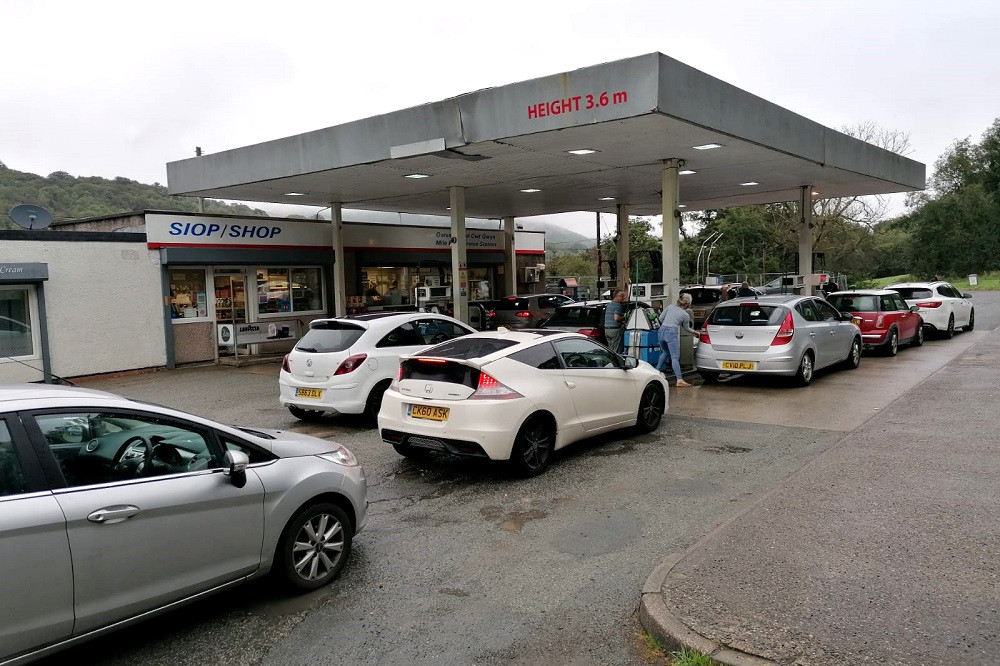Cardiff University prof dismisses claim that fuel crisis is ‘fabricated’ by the media

A Cardiff University professor has dismissed the suggestion that the fuel crisis has been “fabricated” by the media.
Professor Karin Wahl-Jorgensen said the crisis, which has seen people panic buying fuel, long queues at petrol stations, and even fights breaking out in some cases, was “there for people to see”.
She argued that “any crisis like this is inherently newsworthy”, and that “it is media’s responsibility to report on important issues that affect the public”.
The professor also pointed out that “ordinary people are sharing images of these queues on social media”.
An unscientific live poll run by YouGov poll suggested that roughly 47% of people believe the recent fuel shortages have been caused by the media.
The First Minister Mark Drakeford has said there is a shortage of HGV drivers because the UK Government “took us out of the European Union”.
He also accused the UK Government of a “derisory attempt to solve a problem” of its “own creation” after it U-turned on introducing visas for overseas workers.
‘Ordinary people’
Professor Karin Wahl-Jorgensen from Cardiff University told ITV Cymru Wales: “I think the crisis was there for people to see and ordinary people are sharing images of these queues on social media.
“So I don’t think this crisis is fabricated by the media. Equally I think it’s important to reflect on how media organisations choose to cover it, what kind of elements they choose to amplify and emphasise and what which part of the story are maybe not told in quite so much detail.
“We have to recognise that any crisis like this is inherently newsworthy, and therefore it is media’s responsibility to report on important issues that affect the public and also to obviously hold those who are responsible to account.
“In the case of a crisis like this one…. the media really have to weigh their responsibility around the extent to which they cover such a story, and also the way in which that story is covered, against the risk of excessive or sensationalist coverage.
“We’re operating in a very complex media ecosystem… where you have a variety of different news organisations, you also have any growing role of social media, and then you have all sorts of different kinds of actors who may be sharing misinformation or based sensationalist information, sometimes for very good reasons and other times for more kind of harmful reasons.
“I think that also means that traditional news media, which report on stories in a responsible manner, are more important than they ever have been”.
Support our Nation today
For the price of a cup of coffee a month you can help us create an independent, not-for-profit, national news service for the people of Wales, by the people of Wales.






so a professor of journalism sticks up for journalism, there’s a surprise. There wasn’t a shortage of tanker drivers 2 weeks ago, so what happened or why did it happen, is this a distraction from the real shortage of gas, all those EV owners will soon have the smug smile wiped off their faces when their electricity bills skyrocket.
There was no crisis last Thursday, until the media started covering a few score empty fillig stations in the south east. And as the south east of England is the centre of the world and relevant to their lifestyle, they went overboard, thus causing the ensuing chaos UK wide.
With the rise of social media it is no longer possible to hide the news from the public at large.
No doubt this woman voted for Brexit, whose agenda is to deflect any criticism away from Britain leaving the EU in favour of attacking the reporting media for causing the fuel panic buying. And If anything was engineered, was by the Conservative far-right & Tory donors, who no doubt have shares & directorships in the various companies responsible for the refining & supplying our Oli, gas & petrol Yes, Covid was a factor, but not the main reason for the panic buying. The blame lies soley at the feet of the Conservatives & Leave, whose lack of post-Brexit foresight now… Read more »
A professor of economics? Of something relevant? Ah, no, journalism. Who could guessed. What was a local problem to one region of the UK was exported by everyone being TOLD that there were shortages, so people start panic buying, and it becomes a self fulfilling prophecy.